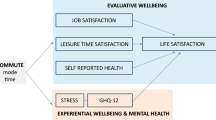Abstract
A sample of 440 full-time employed couples from 11 states was examined to determine the differences between time spent on housework by husbands and wives in rural and urban areas. More time is spent in housework in rural families than in urban families because time spent in housework is greater for rural women than for urban women, while rural and urban husbands' times do not differ. Education of spouses, job status differentials, and age of the younger child do not significantly interact with rural-urban residence and sex of the spouse. However, family income does significantly influence the relationship between time spent on housework for rural and urban husbands and wives.
Similar content being viewed by others
References
Abdel-Ghany, M., & Nichols, S. Y. Husband/wife differentials in household work time: The case of dual earner families. Home Economics Research Journal, 1983, 12, 159–167.
Blau, F. D., & Ferber, M. A. Women in the labor market: The last twenty years. In L. Larwood, A. H. Stromberg, & B. A. Gutek (Eds.), Women and work: An annual review. Beverly Hills, CA: Sage Publications, 1985.
Coward, R. T., & Smith, W. M. Families in rural society. In D. Dillman & D. Hobbs (Eds.), Rural society in the U.S.: Issues for the 1980s. Boulder, CO.: Westview Press, 1982.
Ericksen, J. A., Yancy, W. L., & Ericksen, E. P. The division of family roles. Journal of Marriage and the Family, 1979, 49, 301–313.
Fox, K. D., & Nickols, S. Y. The time crunch: Wife's employment and family work. Journal of Family Issues, 1983, 4, 61–82.
Hafstrom, J. L., & Schram, V. R. Housework time of wives: Pressure, facilitators, constraints. Home Economics Research Journal, 1983, 11(3), 245–254.
Hobbs, D. J. Rural problems in the 1980s: Problems and prospects. The Rural Sociologist, 1983, 3(2), 62–66.
Johnson, P. J., & Firebaugh, F. M. A typology of household work performance by employment demands. Journal of Family Issues, 1985, 6, 83–105.
Juster, F. T., & Stafford, F. P. (Eds.), Time, goods, and well-being. Ann Arbor, MI: Institute for Social Research, University of Michigan, 1985.
Kohn, M., & Schooler, C. Work and personality: An inquiry into the impact of social stratification. Norwood, NJ: Alex Publishing, 1983.
Lovingood, R. (Ed.), Family time use: An eleven-state urban/rural comparison. Virginia Agricultural Experiment Station Bulletin No. VPI-2, 1981.
Meissner, M., Humphreys, E. W., Meis, S. M., & Scheu, W. J. No exit for wives: Sexual division of labor and the cumulation of household demands. The Canadian Review of Sociology and Anthropology, 1975, 12, 424–439.
Nichols, S. Y., & Metzen, E. J. Housework time of husband and wife. Home Economics Research Journal, 1978, 85–97.
Nickols, S. Y., & Metzen, E. J. Impact of wife's employment upon husband's housework. Journal of Family Issues, 1982, 3(2), 199–216.
Nyquist, L., Slivken, K., Spence, J. T., & Helmreich, R. K. Household responsibilities in middle-class couples: The contribution of demographic and personality variables. Sex Roles, 1985, 12(1/2), 15–34.
Pleck, J. Husband's and wives' family work, paid work and adjustment. Wellesley, MA: Wellesley College for Research on Women, 1982.
Robinson, J. P. How Americans use time: A social-psychological analysis of everyday behavior, New York: Praeger, 1977.
Schooler, C., Miller, J., Miller, K. A., & Richtrand, C. N. Work for the household: Its nature and consequences for husbands and wives. American Journal of Sociology, 1984, 90(1), 97–124.
Tickameyer, A. Rural-urban influences on legislative power. Rural Sociology, 1983, 48(1), 133–147.
Walker, K. E., & Woods, M. E. Time use: A measure of household production of family goods and services. Washington, D.C: American Home Economics Association, 1976.
Weigand, E. Use of time by full-time and part-time homemakers. Cornell University Agricultural Experiment Station, Memoir No. 330, 1954.
Willits, F. K., Bealer, R. C., & Crider, D. Persistence of rural/urban differences. In D. Dillman & D. Hobbs (Eds.), Rural society in the U.S.: Issues for the 1980s Boulder, CO: West-view Press, 1982.
Wright, J., & Wright, S. Social class and parental values: A partial replication and extension of the Kohn thesis. American Sociological Review, 1976, 41, 527–537.
Author information
Authors and Affiliations
Additional information
The authors gratefully acknowledge financial support from the Louisiana Agricultural Experiment Station. This study contributes to Regional Research Project NE-113, “Use of Time in Rural and Urban Families.” Cooperating states are California, Connecticut, Louisiana, New York, North Carolina, Oklahoma, Oregon, Texas, Utah, Virginia, and Wisconsin. Approved for publication by the director of the Louisiana Agricultural Experiment Station as Manuscript No. 86-25-0359.
Rights and permissions
About this article
Cite this article
Lawrence, F.C., Draughn, P.S., Tasker, G.E. et al. Sex differences in household labor time a comparison of rural and urban couples. Sex Roles 17, 489–502 (1987). https://doi.org/10.1007/BF00287731
Issue Date:
DOI: https://doi.org/10.1007/BF00287731




